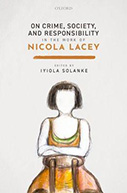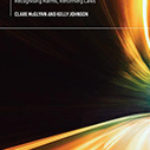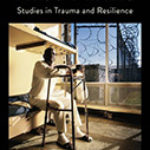On Crime, Society, and Responsibility in the Work of Nicola Lacey

Editor: Iyiola Solanke
Publisher: Oxford University Press, 2021. 288 pages
Reviewer: Markus Dubber ǀ November 2021
On Crime, Society and Responsibility in the Work of Nicola Lacey, a lively Festschrift-not-a-Festschrift dedicated to the work (and the person) of Nicola Lacey, accomplishes several things, each worth the price of admission.
It provides the uninitiated with a terrific introduction to the multifaceted and -dimensional oeuvre of this tremendously influential and generous scholar across a wide range of disciplines, subjects, countries, and systems. Using the question of responsibility as the rug that ties the room together, the contributors engage with Lacey’s writings on conceptualizations and categorizations of responsibility across time (and space), the puzzle of blame (and blameworthiness), the place (or absence) of women in criminal law doctrine and theory, the historical and comparative analysis of criminal law, and the political economy of criminal law and state penal governance more generally. Lacey’s expertly crafted—and eminently readable—biography of H.L.A. Hart doesn’t quite get the chapter treatment, but then it’s impossible to cover the full spectrum of Lacey’s intellectual curiosity and scholarly output in a single volume. In its insightful empathy, Lacey’s Hart biography recalls another great scholarly-personal biography of one brilliant criminal law scholar by another from a different time and place: Gustav Radbruch’s 1934 Juristenleben on the great German scholar, judge, and writer Paul Johann Anselm Feuerbach.
The book also captures a snapshot of cutting-edge work, featuring contributions by the likes of Iyiola Solanke (who edited the volume and wrote the introduction), Andrew Ashworth & Lucia Zedner, Antony Duff, Ngaire Naffine, John Gardner, Hanna Pickard, Alan Norrie, Arlie Loughnan, Emily Jackson, Lindsay Farmer, and David Garland (in order of appearance). None of these authors is content to fill in gaps in Lacey’s work or collect additional examples of the illuminative power of her contributions to criminal law scholarship. Instead, they draw on their own perspectives and expertise to put Lacey’s work to the test, raising questions, probing implications, challenging connections. As a result, the reader catches enticing glimpses of their minds in action, which add up to a stimulating overview of some of the best current criminal law thinking, all inspired by Lacey’s work.
As a bonus, the collection includes a provocative foreword by Susanne Baer, a law-professor-turned-justice-of-the-German-Constitutional-Court. Tellingly entitled “An Ambivalent Affair: but Worth the Effort,” the preface hints what a Laceyian treatment of the Festschrift genre might look like, one that would situate the Festschrift “in its political economy, just like the law” (p. v). Given that the Begriff of a Festschrift appears to be about as patriarchal, traditional, insular, and, well, German as the long-standing project of Strafrechtswissenschaft as a Doctrinal Science of Criminal Law, is a feminist/progressive/inclusive/interdisciplinary/common law Festschrift possible? Well, if it provides an opportunity to celebrate the work and person of a truly remarkable scholar like Nicola Lacey, why not?
Markus Dubber, Professor of Law & Criminology and Director of the Centre for Ethics, University of Toronto


